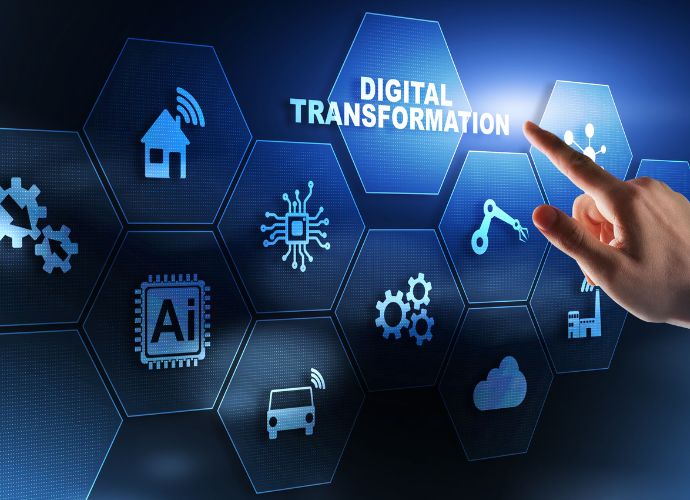In the early 20th century, fiction writers had already conceptualized the idea of sentient machines. The Tin Man from The Wizard of Oz and the robot Maria from the 1927 film Metropolis were, perhaps the first sentient machines to become major pop culture characters.
While artificial intelligence (AI) and machine learning (ML) have not yet resulted in truly sentient robots, even the most imaginative fiction writers of 100 or even 20 years ago could not have imagined just how much “smart” machines would change our day-to-day lives.
Today, the process by which technologies such as AI and ML are disrupting our ways of life is often described as “digital transformation.”
What Is Digital Transformation?
Generally speaking, digital transformation or digital disruption is the integration of digital technologies in ways that fundamentally change how an organization operates. While the term suggests a purely technological change, all digital transformation will include and cause cultural and social shifts within organizations and industries.

What Industries Will Be Most Affected?
Virtually all industries and practices will be affected by digital transformation. Indeed, the process has long been underway in many different areas for the past few decades. Industries that will be most affected by ongoing trends in digital transformation include the following:
1.) Finance
In finance, digital transformation has been defined by the rise of fintech and alternative financial services. As a reaction to these, traditional institutions have mostly undergone digital banking transformation as part of their efforts to stay relevant in today’s volatile financial markets.
Both traditional and alternative finance businesses are now increasingly reliant on artificial intelligence and machine learning to facilitate decision-making. While this is nothing new in finance, today’s generation of banking platforms is much more capable in terms of the types of automation they could perform.
Digital finance transformation has also resulted in more reliable cloud-based banking systems. These have also massively impacted the industry by giving rise to purely digital services and rendering brick-and-mortar banks much less relevant. Even now, the number of brick-and-mortar banking locations continues to shrink as the finance industry continues to go digital.
2.) Healthcare
While many of the world’s healthcare systems are still largely facilitated through manual processes, early forays into the digitization of healthcare are already helping to improve health outcomes.
Thanks to a combination of better data management, artificial intelligence, and secure mobile platforms, patients can expect fewer diagnostic and billing errors, better data security, and faster claims approvals. These technologies are already being used to reduce error rates in increasingly overburdened systems, allowing healthcare providers all over the world to do much more with less.
3.) Retail
Today, even the smallest retailers use enterprise resource planning software, marketing automation systems, and ecommerce storefronts. Until recently, however, most of these tools still required a good deal of manual inputs, particularly when reconciling data from different sources.
To enjoy even more efficiency gains, more retailers are starting to use highly advanced AI and ML tools. When implemented correctly, these tools can increase the efficiency of existing systems and also facilitate highly accurate data intelligence capabilities, giving early adopters an edge over other retailers.
4.) Transportation
Digitization has been taking place in transportation since the late 20th century. Today, virtually all new vehicles sold have at least some electronic and digital components in them for doing everything from controlling fuel-air mixtures to adjusting tire pressure. However, this is nothing compared to the self-driving vehicles that may one day perform the bulk of our logistics and commute drives.
Again, current developments in AI and ML are giving researchers much reason to be optimistic. Though we may yet be decades away from fully autonomous transportation systems, even contemporary technology can dramatically reduce the cognitive load involved in operating virtually any kind of vehicle. Even today, these tech solutions are saving lives by making our land, sea, and air transportation networks safer than ever before.
5.) Education
While immensely valuable, mainstream educational systems are necessarily hampered by the simple fact that learners always vastly outnumber educators. This makes it exceedingly difficult to deliver a learning experience that is tailored to every individual’s learning style.
Digital platforms have already done much to help resolve this issue by providing students with an abundance of options that may be suited to their learning preferences. The next generation of digital learning technologies is going to take this even further by offering adaptive learning powered by AI and ML.
AI and ML are now making knowledge more accessible to a wider variety of learners. They already enable such benefits as automatic document translations and image identification. Soon, they will be able to predict the optimal learning styles and approaches for specific students or users, saving much time and freeing up educators and trainers to focus on more important concerns.
Why People Should Understand Digital Transformation
By understanding the implications of digital transformation, individuals and societies can be in a much better position to adjust and benefit from any disruption caused by these technologies. This is especially true when one is choosing a service provider. For example, a financial institution that has successfully undergone digital banking transformation is probably going to be much more capable than a bank that is still reliant on decades-old technology. The same could be said for a healthcare provider or an educational institution.
Digital transformation has already changed our lives. As artificial intelligence and machine learning become more powerful and sophisticated, we will continue to see more industries and areas of life shift in unpredictable ways. Learning about these developments can, therefore, reduce the risks that come from being left behind.








